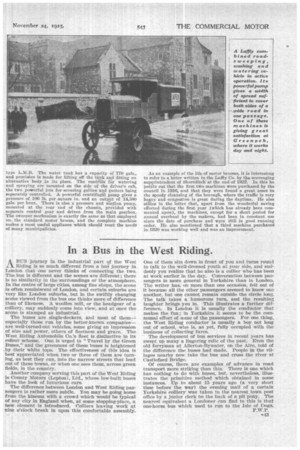In a Bus in the West Riding.
Page 27

If you've noticed an error in this article please click here to report it so we can fix it.
A BUS journey in the industrial part of the West IV Riding is so much different from a bus journey in London that one never thinks of connecting the two. The bus is different and the scenes are different ; there is no similarity in the surroundings or the atmosphere. In the centre of large cities, among fine shops, the scene is often reminiscent of London, and certain suburbs are very like London suburbs, but in the swiftly changing scene viewed from the bus one thinks more of difference than of likeness. A woollen mill, or the headgear of a colliery, may suddenly come into view, and at once the scene is stamped as industrial
The buses are single-deckers, and most of them— especially those run by the better-known companies-are well-turned-out vehicles, some giving an impression of size and power, others of fleetness and grace. The West Riding Automobile Co.'s fleet is distinctive in its colour scheme. One: is urged to "Travel by the Green Buses," and the greenness of these buses is heightened by their white tops. The effectiveness of this idea is best appreciated when two or three of them are turning, as best they can, into the narrow streets that lead out of these towns, or when one sees them, across green fields, in the country.
Another company serving this part of the West Riding is County Motors (Lepton), Ltd., whose low-built buses have the look of luxurious cars.
The difference between London and West Riding passengers is rather more subtle. You may be going home from the kinema with a crowd which would be typical of any city in England when, at some stopping-place, a new element is introduced. Colliers leaving work at nine o'clock break in upon this comfortable assembly.
One of them sits down in front of you and turns round to talk to the well-dressed youth at your side, and suddenly you realize that he also is a collier who has been at work earlier in the day. Conversation between passengers is more general in Yorkshire than in London. The writer has, on more than one occasion, felt out of it because all the other passengers seemed to know one another, but one cannot remain outside the circle long. The talk takes a humorous turn, and the resulting laughter brings you in. This illustrates a further difference. In London it is usually the conductor that makes the fun; in Yerkshire it seems to be the communal effort of some of the passengers. For one thing, the West Riding conductor is usually a boy not long out of school, who is, as yet, fully occupied with the business of collecting fares.
The development of bus services in recent years has swept up many a lingering relic of the past. Even the Old ferryman at Allerton-Bywater, on the Aire, told of the difference the buses had made. People in the villages nearby now take the bus and cross the river at Castleford Bridge.
Of course, there are examples of advance in road transport more striking than this. There is one which has nothing to do with buses, but, nevertheless, illustrates the primitive method which obtained in some instances. Up to about I'd years ago (a very short time beforethe war) the evening mail of a certain Yorkshire colliery was taken to the nearest town post office by a junior clerk bn the back of a pit pony. The nearest equivalent a Londoner can find to this is that one-horse bus which used to run to the Isle of Dogs, F.W.P. 43




































